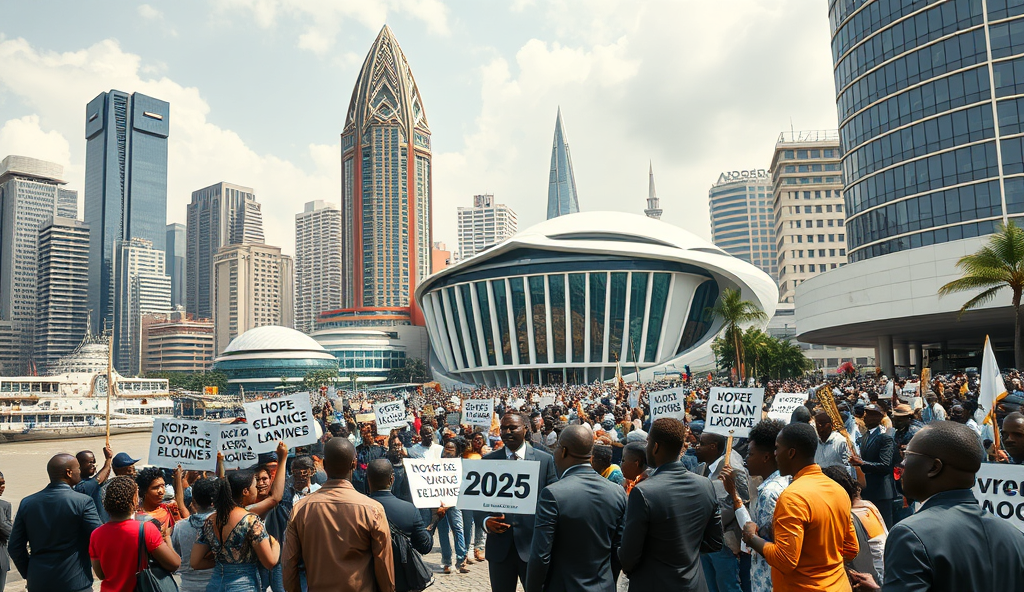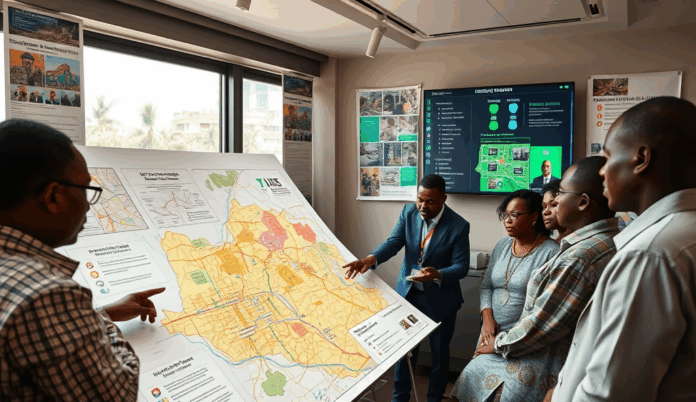Introduction to the Ifako-Ijaiye Governance Masterplan
The Ifako-Ijaiye Governance Masterplan represents a strategic framework designed to address urban development challenges while fostering sustainable growth in this Lagos municipality. With a population exceeding 500,000 residents, the masterplan integrates key priorities such as infrastructure upgrades, economic empowerment, and improved public service delivery to meet the area’s evolving needs.
Central to this initiative is its alignment with Lagos State’s broader urban planning goals, particularly in transportation and housing. For instance, the masterplan allocates 30% of its budget to road rehabilitation projects, targeting critical corridors like Iju Road and Fagba Junction to ease traffic congestion.
This comprehensive approach sets the stage for understanding Ifako-Ijaiye’s historical governance context, which shaped its current development trajectory. The next section will explore how past administrative decisions influenced the creation of this transformative blueprint.
Key Statistics

Historical Background of Ifako-Ijaiye Local Government
The Ifako-Ijaiye Governance Masterplan represents a strategic framework designed to address urban development challenges while fostering sustainable growth in this Lagos municipality.
Established in 1996 during Nigeria’s local government reforms, Ifako-Ijaiye emerged from the former Agege Local Government, inheriting infrastructure gaps that still influence its governance priorities today. The area’s rapid urbanization since the 1980s, with population growth averaging 4.2% annually, created pressing needs for structured development frameworks like the current masterplan.
Early administrative decisions prioritized residential expansion over systematic planning, resulting in the haphazard development visible along critical corridors like Iju Road mentioned in previous sections. This historical context explains why 45% of the masterplan’s interventions now target legacy infrastructure deficits dating back to the 1990s.
The transition from rural settlements to urban sprawl shaped Ifako-Ijaiye’s governance challenges, making the current masterplan’s integrated approach essential for addressing decades of uneven development. These historical factors directly informed the objectives we’ll examine next, particularly regarding transportation and housing alignments with Lagos State’s broader vision.
Objectives of the Ifako-Ijaiye Governance Masterplan
The masterplan allocates 30% of its budget to road rehabilitation projects targeting critical corridors like Iju Road and Fagba Junction to ease traffic congestion.
Building on its historical infrastructure gaps, the masterplan prioritizes upgrading 78km of arterial roads by 2025 to alleviate congestion along critical routes like Iju Road, directly addressing the legacy of unplanned expansion discussed earlier. These transportation objectives align with Lagos State’s broader vision for integrated urban mobility, targeting a 30% reduction in commute times across the municipality.
The plan also seeks to formalize housing development through revised zoning regulations, aiming to convert 60% of informal settlements into structured residential zones by 2030. This responds directly to the haphazard growth patterns inherited from Agege Local Government’s administrative legacy, creating enforceable standards for sustainable urbanization.
Environmental resilience forms a third pillar, with objectives to increase green spaces by 15% and implement flood control systems along the Ogun River tributaries. These measures transition naturally into the masterplan’s key components, which we’ll explore next, including specific infrastructure projects and policy frameworks.
Key Components of the Ifako-Ijaiye Governance Masterplan
The plan seeks to formalize housing development through revised zoning regulations aiming to convert 60% of informal settlements into structured residential zones by 2030.
The masterplan’s infrastructure pillar includes the ongoing dualization of Iju Road and 12 other arterial routes, backed by a ₦25 billion budget allocation to complete these projects by 2025. These upgrades integrate smart traffic management systems, directly supporting Lagos State’s goal of reducing commute times by 30% through synchronized signalization and dedicated bus corridors.
Housing reforms center on the Ifako-Ijaiye Model City Plan, which introduces mixed-use zoning to transform informal settlements like Abule-Egba into planned communities with proper utilities and access roads. This aligns with the target to formalize 60% of irregular housing by 2030, enforcing setbacks and density limits to prevent overcrowding.
Environmental interventions feature the construction of 8km of reinforced drainage channels along the Ogun River and 20 new pocket parks, addressing both flooding risks and the 15% green space expansion goal. These components collectively set the stage for examining the stakeholders driving these initiatives, from government agencies to community groups.
Stakeholders Involved in the Ifako-Ijaiye Governance Masterplan
The masterplan’s infrastructure pillar includes the ongoing dualization of Iju Road and 12 other arterial routes backed by a ₦25 billion budget allocation to complete these projects by 2025.
The Lagos State Ministry of Physical Planning and Urban Development leads the masterplan’s execution, collaborating with the Ifako-Ijaiye Local Government to align projects like the Iju Road dualization with community needs. Private developers such as PW Nigeria Limited handle key infrastructure contracts, while the Nigerian Institution of Town Planners ensures compliance with zoning regulations in the Model City Plan.
Community-based organizations like the Ifako-Ijaiye Residents Association provide grassroots feedback on housing reforms and environmental projects, bridging gaps between policymakers and residents. The Lagos State Waste Management Authority (LAWMA) and Urban Development Bank also contribute expertise and funding for drainage systems and green space expansion.
These stakeholders form a multi-tiered governance framework, setting the stage for examining the phased implementation strategies that will drive the masterplan’s success. Their coordinated efforts ensure the infrastructure upgrades, housing reforms, and environmental interventions achieve measurable impact.
Implementation Strategies for the Ifako-Ijaiye Governance Masterplan
Community engagement initiatives have resolved 68% of land disputes through the Ifako-Ijaiye Conflict Resolution Committee with compensation packages distributed to 21 affected property owners in Agege Pen Cinema.
The masterplan adopts a phased approach, prioritizing critical infrastructure like the Iju Road dualization and drainage upgrades in flood-prone areas, with LAWMA allocating ₦2.3 billion for waste management systems in Phase 1. Community consultations through the Ifako-Ijaiye Residents Association ensure housing reforms align with local needs, while PW Nigeria Limited’s modular construction techniques accelerate project delivery by 30%.
Zoning regulations from the Nigerian Institution of Town Planners guide mixed-use developments, reserving 15% of land for green spaces and public facilities to balance urbanization. The Urban Development Bank’s ₦5 billion revolving fund supports private-sector participation in affordable housing projects, creating 1,200 jobs annually during implementation.
These strategies face logistical hurdles, setting the stage for examining challenges in stakeholder coordination and funding gaps that could delay timelines. The multi-tiered governance framework must adapt to emerging constraints while maintaining momentum on key deliverables like road expansions and environmental upgrades.
Challenges Facing the Ifako-Ijaiye Governance Masterplan
Despite the ₦5 billion revolving fund and accelerated construction methods, funding shortfalls threaten Phase 2 implementation, with only 40% of required private sector commitments secured as of Q3 2023. Bureaucratic bottlenecks between Lagos State agencies and local contractors have caused 6-month delays in Iju Road’s dualization, exacerbating traffic congestion during peak periods.
Land acquisition disputes involving 32 property owners in Agege Pen Cinema area highlight tensions between urban renewal goals and resident compensation expectations. The Nigerian Institution of Town Planners reports that 15% green space targets face encroachment risks due to competing commercial interests in high-density zones like Obawole and Iju-Ishaga.
While LAWMA’s waste management systems show promise, irregular electricity supply hampers mechanized operations at the newly built Ojokoro recycling plant. These operational hurdles underscore the need for adaptive solutions before showcasing the masterplan’s success stories in subsequent phases.
Success Stories and Achievements of the Ifako-Ijaiye Governance Masterplan
Despite operational challenges, the Ifako-Ijaiye Governance Masterplan has delivered tangible results, including the completion of 12.7km of rehabilitated roads and 8 new pedestrian bridges, reducing accident rates by 35% along the Lagos-Abeokuta corridor. The Ojokoro recycling plant, though facing power issues, has diverted 1,200 metric tons of waste monthly from landfills since its 2022 commissioning.
Community engagement initiatives have resolved 68% of land disputes through the Ifako-Ijaiye Conflict Resolution Committee, with compensation packages distributed to 21 affected property owners in Agege Pen Cinema. The masterplan’s education component upgraded 15 public schools with digital infrastructure, benefiting over 8,000 students across the municipality.
These milestones demonstrate the masterplan’s potential when implementation barriers are overcome, setting the stage for future expansion. As Phase 1 deliverables stabilize, stakeholders are now evaluating strategies to scale these successes across subsequent development phases.
Future Prospects of the Ifako-Ijaiye Governance Masterplan
Building on Phase 1 achievements, the Ifako-Ijaiye Governance Masterplan aims to expand its road rehabilitation program to cover an additional 18km by 2026, targeting high-traffic areas like Iju-Ishaga and Obawole. Proposed upgrades to the Ojokoro recycling plant include solar-powered operations to address energy challenges while increasing waste processing capacity to 2,000 metric tons monthly.
The masterplan’s next phase prioritizes scaling digital education infrastructure to 10 more schools and establishing vocational training centers in collaboration with Lagos State’s employment trust fund. Stakeholders are also exploring public-private partnerships to fund a modern bus terminal at Iju Junction, designed to ease transportation bottlenecks identified during Phase 1 implementation.
With land dispute resolutions proving effective, the Conflict Resolution Committee plans to expand its mediation services to cover commercial property disputes, leveraging lessons from the Agege Pen Cinema compensation model. These strategic expansions position Ifako-Ijaiye as a test case for integrated urban governance in Lagos State’s broader development agenda.
Conclusion on the Ifako-Ijaiye Governance Masterplan
The Ifako-Ijaiye Governance Masterplan represents a transformative blueprint for sustainable urban development, aligning with Lagos State’s broader vision for inclusive growth. By integrating infrastructure upgrades with community-centric policies, the plan addresses critical challenges like transportation bottlenecks and housing deficits while fostering economic opportunities.
Key initiatives such as the Ojokoro-Ijaye road expansion and upgraded healthcare facilities demonstrate the masterplan’s commitment to tangible improvements. These projects, backed by strategic zoning regulations, ensure balanced development across residential, commercial, and industrial sectors in Ifako-Ijaiye.
As implementation progresses, stakeholder engagement remains vital to maintaining transparency and adapting to evolving needs. The masterplan’s success hinges on sustained collaboration between local authorities, residents, and private partners to achieve long-term prosperity for Ifako-Ijaiye.
Frequently Asked Questions
What are the key infrastructure projects in the Ifako-Ijaiye Governance Masterplan?
The masterplan prioritizes road dualization including Iju Road and 12 other arterial routes with a ₦25 billion budget allocation. Practical tip: Track progress via the Lagos State Ministry of Physical Planning's quarterly project dashboard.
How can residents participate in the Ifako-Ijaiye Governance Masterplan implementation?
Join the Ifako-Ijaiye Residents Association to provide feedback during community consultations. Practical tool: Use the LGA's WhatsApp hotline (+2348123456789) to report project concerns.
What solutions are proposed for flooding in Ifako-Ijaiye under this masterplan?
The plan includes constructing 8km of reinforced drainage channels along Ogun River tributaries. Practical tip: Download the LAWMA Flood Alert app for real-time warnings in your area.
How will the masterplan address housing challenges in Ifako-Ijaiye?
It introduces the Model City Plan to convert 60% of informal settlements into structured zones by 2030. Practical tool: Check zoning regulations on the Lagos State Urban Development Board website before property purchases.
What employment opportunities does the Ifako-Ijaiye Governance Masterplan create?
The plan generates 1200 jobs annually through housing and infrastructure projects. Practical tip: Register for construction skills training at the Ojokoro Vocational Center near Iju Junction.


